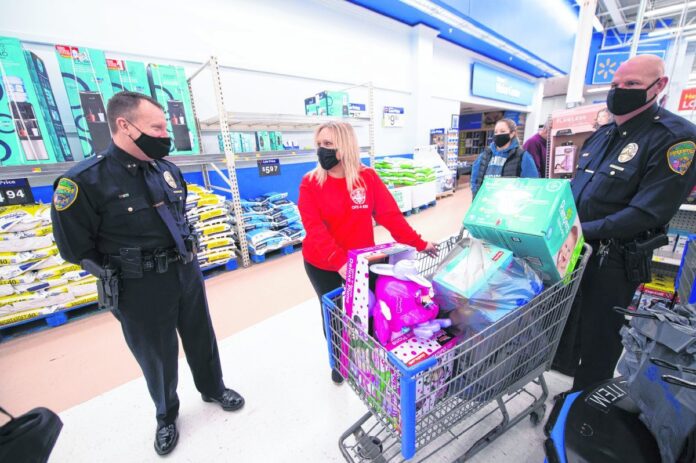
GREENFIELD — Some people may still think COVID-19 isn’t real or isn’t as bad as is commonly thought. Jeff Rasche, chief of the Greenfield Police Department, has a different take after recently becoming ill.
Rasche, 54, who used to be an avid marathon runner, has been wearing a heart monitor and will continue to do so until the end of December. Doctors are keeping a close watch on his well-being after he was infected by the novel coronavirus in early November and suffered some lingering effects.
From heart palpitations to brain fog, Rasche hadn’t mustered up the strength to even go out for a brisk walk and push himself as of late. While he’s back at work, he admits there are days after the lunch hour when he already feels spent.
“I’d just be sitting at my desk doing paperwork and my heart rate would shoot up to over 100 beats a minute and would just stay there,” Rasche said. “That’s abnormal for me.”
While Rasche knows the virus affects people differently — some infected people never show symptoms — he hasn’t been as fortunate. It’s ironic, since he is fit and considered a healthy person for his age group.
Rasche felt compelled to get a COVID-19 test after he found out Mayor Chuck Fewell had tested positive. Rasche had been in the mayor’s office for a meeting a few days before Fewell became ill. Rasche self-quarantined immediately and received a positive test result shortly after.
Rasche said he felt fine during the first five to six days of his quarantine. He was even able to do some work around his home.
“I’d have bet a paycheck I wasn’t sick,” Rasche said. “I was active and kept busy.”
But soon after, he was hit with severe headaches, and his body would not let him do anything other than sleep.
“All of a sudden, this was real, and I didn’t know what I was going to wake up to the next morning,” Rasche said. “I never knew if I was going to get additional symptoms or not.”
Family and friends kept a close eye on Rasche during his illness, and he began to feel better. The lingering effects of heart palpitations hit him a few days before he was set to head back to work.
He has since given up all caffeine, including his beloved mini dark chocolate bars he used to munch on at his desk.
Rasche admits he was a little taken aback to get the virus because he’d been preaching daily to his officers and staff about following protocol to protect themselves. Yet he was the first one at the department to test positive.
“I think a lot of people have gone through that mindset this isn’t going to be that bad,” Rasche said. “But, all of a sudden, here I am.”
The virus has Rasche baffled. He was in a vehicle with his 80-year-old father after being in the meeting with the mayor. Yet his dad did not catch COVID-19.
“He made it through and never got sick,” Rasche said.
Rasche noted the heart irregularities are lessening, and he feels like he’s going to be fine in time. But he wants people to know that COVID-19 is a dire threat.
“My doctor told me, this virus is very powerful, and it can affect your brain,” Rasche said.
He laughed when he thought about his actions one night last week after he got home and found himself walking around his home wondering what he was looking for.
“The brain fog is real,” Rasche said. “But, I’m a lot better, and I don’t think there is anything serious.”
Still, he’s spoken with others who have experienced the same issues while recovering from COVID and wants people to be careful.
As for the issue of wearing masks, Rasche is in favor of it. He pointed to research, based on analysis of contact tracing, that shows people are not catching the virus when they attend meetings, school or church or at the grocery while wearing masks.
“The report is very clear,” Rasche said. “Contact tracing shows people are being infected at social gatherings at the homes through their family and friends when they’re not wearing a mask.”
He added: “But, we want people to know there is no timeout session for this. A lot of people will not know they are sick.”
He encouraged people to remain mindful of the threat.
He had planned to a vacation to the beach in January but now isn’t so sure.
“Unfortunately we’re probably going to have to be making those kinds of tough decisions for a while,” said Rasche, who intends to get the vaccine when it becomes available for first-responders. “We have to just try to remember to do the right thing even if it’s very aggravating.”




